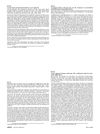 October 2021 in “Turkderm”
October 2021 in “Turkderm” Hormonal imbalances, not insulin resistance or dyslipidemia, may be more important in causing acne in women over 25.

Diet and supplements can significantly affect acne, with some foods and nutrients reducing and others worsening it.
 February 2009 in “Journal of The American Academy of Dermatology”
February 2009 in “Journal of The American Academy of Dermatology” Fractional infrared technology is effective and safe for treating cervical laxity.
 38 citations,
October 1996 in “Dermatologic Clinics”
38 citations,
October 1996 in “Dermatologic Clinics” Certain hormone treatments can improve acne and related conditions in women.
 30 citations,
January 1998 in “Dermatology”
30 citations,
January 1998 in “Dermatology” Birth control pills and cyproterone acetate can help treat acne in women, especially when linked to hormonal issues.
 July 2022 in “International journal of medical science and clinical invention”
July 2022 in “International journal of medical science and clinical invention” Women with irregular periods should be checked for PCOS and treated early to prevent complications, with birth control pills helping to manage symptoms.
2 citations,
October 2021 in “Journal of Cosmetic Dermatology” Finasteride is more effective and satisfactory than montelukast for treating moderate acne in women.
9 citations,
January 2013 in “BioMed research international” The conclusion suggests a new acne treatment that controls bacteria by reducing water in the skin's pores using sugar-like substances.
 January 2024 in “Journal of Microorganism Control”
January 2024 in “Journal of Microorganism Control” The antibacterial toner can effectively kill acne-causing bacteria by penetrating skin plugs.
62 citations,
July 2022 in “Science Immunology” TREM2 macrophages and unsaturated lipids contribute to acne inflammation.
 30 citations,
April 2007 in “Dermatologic Clinics”
30 citations,
April 2007 in “Dermatologic Clinics” The document concludes that new treatments are needed to better manage acne and reduce side effects related to current therapies.
9 citations,
June 2020 in “Trials” The trial aims to test if spironolactone is an effective acne treatment for women without the side effects of current treatments.
 September 2022 in “Dermato”
September 2022 in “Dermato” Adult acne is often related to hormonal disorders, especially in women, and may need long-term treatment involving specialists.
 April 2022 in “The Egyptian Journal of Hospital Medicine”
April 2022 in “The Egyptian Journal of Hospital Medicine” Platelet Rich Fibrin improves healing and reduces acne scars by slowly releasing growth factors.
 January 2018 in “Elsevier eBooks”
January 2018 in “Elsevier eBooks” The document concludes that proper diagnosis and treatment of follicular disorders are crucial, with specific treatments for conditions like acne, drug-induced eruptions, and rosacea.
 305 citations,
February 2007 in “Hormone and metabolic research”
305 citations,
February 2007 in “Hormone and metabolic research” Human skin makes sexual hormones that affect hair growth, skin health, and healing; too much can cause acne and hair loss, while treatments can manage these conditions.
58 citations,
November 2018 in “Cochrane library” Oral isotretinoin may slightly improve acne but increases the risk of side effects like dry lips and skin; more research is needed to understand its full risks and benefits.
 18 citations,
June 2019 in “Clinical research in dermatology”
18 citations,
June 2019 in “Clinical research in dermatology” Acne can't be cured but can be managed with treatments like benzoyl peroxide and diet changes; it's costly and can lead to scarring and mental health issues.
 18 citations,
January 2013 in “Postepy Dermatologii I Alergologii”
18 citations,
January 2013 in “Postepy Dermatologii I Alergologii” Puberty often causes skin issues like acne and excessive sweating, and treatments require patience as results may vary.
5 citations,
August 1999 in “Disease-a-month” Hormonal imbalances can cause acne, and treatments may include hormone-blocking medications.
 1 citations,
March 2011 in “Informa Healthcare eBooks”
1 citations,
March 2011 in “Informa Healthcare eBooks” Hormonal therapy is effective for treating acne in adult women, especially with signs of high androgen levels.
 March 2024 in “Ukraïnsʹkij žurnal dermatologìï, venerologìï, kosmetologìï”
March 2024 in “Ukraïnsʹkij žurnal dermatologìï, venerologìï, kosmetologìï” Topical retinoids are important for treating acne effectively and safely.
 January 2019 in “Obstetrics & Gynecology International Journal”
January 2019 in “Obstetrics & Gynecology International Journal” Hormonal changes and conditions like polycystic ovarian syndrome are major causes of adult acne in women, with varying prevalence among different ethnicities.
December 2020 in “Journal of Skin and Sexually Transmitted Diseases” No strong link between testosterone or DHEAS levels and acne or hair loss in females.
 233 citations,
November 2002 in “The journal of investigative dermatology/Journal of investigative dermatology”
233 citations,
November 2002 in “The journal of investigative dermatology/Journal of investigative dermatology” Creating stronger blockers for skin enzymes might lead to better treatment for conditions like acne and excessive hair growth.
 76 citations,
January 2007 in “American Journal of Clinical Dermatology”
76 citations,
January 2007 in “American Journal of Clinical Dermatology” Women with PCOS often have skin problems like excessive hair, acne, hair loss, and dark patches, which can be treated with hormonal and non-hormonal therapies.
 60 citations,
October 2014 in “Journal of the American Academy of Dermatology”
60 citations,
October 2014 in “Journal of the American Academy of Dermatology” Dermatologists play a key role in treating skin symptoms of PCOS like dark patches, excess hair, acne, and hair loss.
 56 citations,
October 2018 in “Journal of The American Academy of Dermatology”
56 citations,
October 2018 in “Journal of The American Academy of Dermatology” Androgens play a complex role in skin conditions like acne and hair loss in women, and normal blood levels don't always show true androgen status.
 24 citations,
March 2015 in “Dermatologic Surgery”
24 citations,
March 2015 in “Dermatologic Surgery” Home-use cosmetic laser and light devices show modest results for hair removal and acne treatment, but more research is needed for confirmation.
 24 citations,
January 2001 in “Dermatologic clinics”
24 citations,
January 2001 in “Dermatologic clinics” Hormonal therapy is a treatment option for acne, the only medical treatment for hirsutism, and the most promising for androgenetic alopecia.























